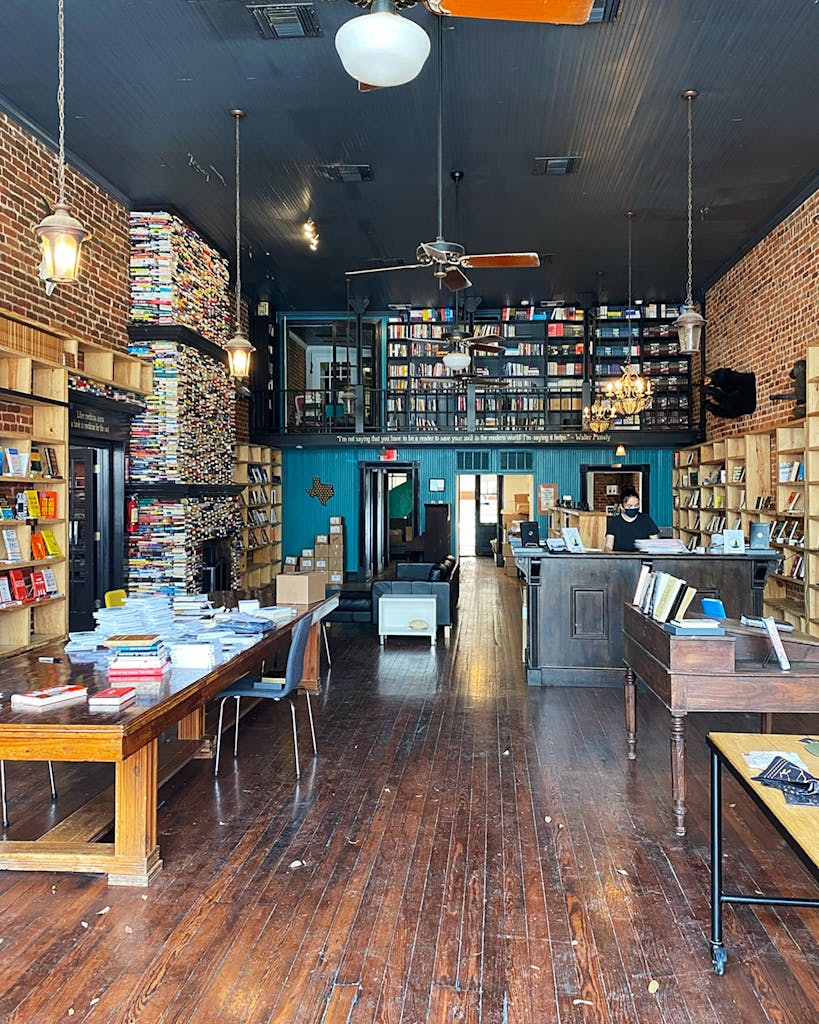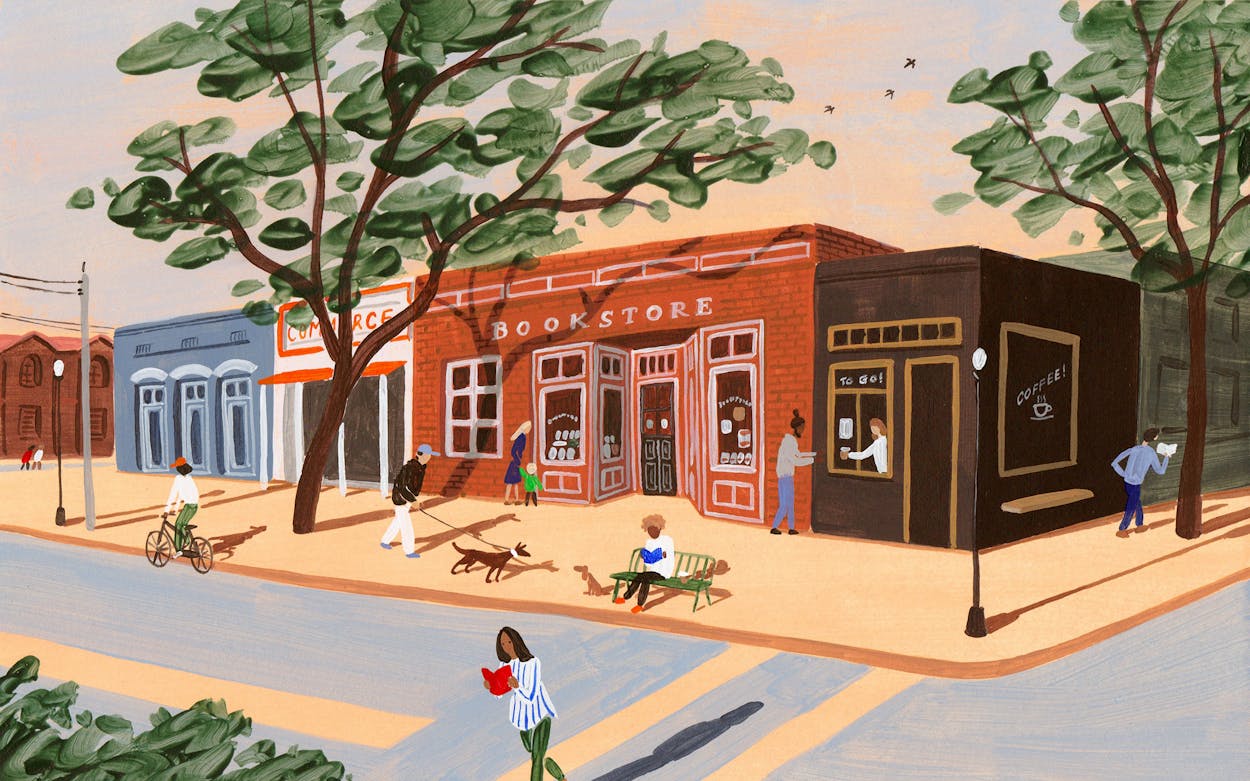When you tell people you’re thinking about opening a bookstore, they’re quick to respond, I’ve always wanted to do that.
It’s every book lover’s fantasy. Yet nothing can quite prepare you for the reality of starting any business, even under normal conditions. Certainly, few dreamers think to prepare for the nightmare of a global pandemic that shutters most brick-and-mortar retail, disrupts supply chains, and kills hundreds of thousands of your fellow citizens.
In January of last year, my wife and I put our life savings down on a 140-year-old building on Main Street in Bastrop, a small town outside Austin—East of Weird goes the slogan—where we’ve lived since 2015. We’d spotted the storefront, which is part of the National Register of Historic Places, while having breakfast one morning at Maxine’s Cafe, just across the street and a few doors down. By February we’d hired our first employees and started renovations. We envisioned hosting events, welcoming customers from the community, and drawing people to this beautiful street on the bluffs of the Colorado River.
Yet by the first week of March, what began with such excitement found me, for obvious reasons, standing between the empty brick walls thinking of that Arrested Development line: I’ve made a huge mistake.
I thought I had some sense of what could go wrong with the venture. Whenever I’m considering an idea I’m excited about, I like to ask friends to talk me out of it. In late 2019, I was cautioned with plenty of pessimistic scenarios and potential difficulties. It’ll take longer than you think. It will cost more than you think. It will be more work than you think.
All of this was correct.
That it would take longer, cost more, and require more work I understood. But that it would then sit unopened for months? That was not on my radar. No child care for a year while we did the build-out? Inconceivable. We certainly didn’t anticipate the surreal reality of the Texas government repeatedly washing its hands of responsibility for protecting its citizens and leaving it up to local businesses to decide whether they were going to contribute to a public health crisis or bleed money every day they voluntarily stayed closed. Oh, and then a freak storm in February took out the state’s power grid. We were blanketed with beautiful snow, but the pipes beneath the building burst and the weight of the ice on the roof sent water rushing in from above as well. A whole wall of inventory was ruined.
Such have been the experiences of members of the small club of people who started businesses during one of the most unusual moments in modern history. One survey of small-business owners who took money from the federal government’s Paycheck Protection Program reported that, on average, their revenues fell 52 percent in the second quarter of 2020 alone. Another paper noted that between February and April of last year, 3.3 million businesses went under—the largest drop on record. Plenty of bookstores were among those casualties. How many have opened during that span? I can’t imagine very many. Not when the Strand, the New York institution that is perhaps the greatest American bookstore, had to lay off nearly two hundred people.
Why do it at all? Why not cut our losses? Because we could afford to keep going, maybe. Because I did once write a book about turning obstacles into fuel. Because something was calling us to this location (quite literally: it turns out that our home phone number once belonged to a previous tenant of the building). Because Bastrop is the lovely town where we’ve decided to make our home and put down roots.
But mostly because I’ve always believed that bookstores are important. In a time of social media, of information bubbles, they matter more than ever. I can remember my father taking me, when I was a child, to the Bookworm, a used bookstore in Sacramento where I bought my first Louis L’Amour western. I remember shopping for books with my grandfather, and when I was old enough wanting to mimic the way he’d stick an address label in the copies he bought as a modern take on the classic practice of ex libris. I remember the philosophy section of the Borders in Riverside, California, when I was in college—the section that changed my life.
As an author, you have the privilege of going on tour and traveling around the world and spending time in these little shops that often play an outsized role in their community. You hear from people who stumble across something you’ve written on a shelf or a table—the kind of discovery that’s possible only in a physical space. It’s not a new phenomenon. There’s a story about Zeno, the founder of Stoicism, who washed up in Athens in the late fourth century BC, a wealthy merchant made penniless after a shipwreck. He walks into a bookshop and hears the owner reading from the works of Socrates. The trajectory of his life is changed in an instant—and so is history. The guiding philosophy of the Roman Empire can trace its roots to that chance encounter between the shelves.
Good things happen in bookstores.
Big ones, small ones, corporate or independent ones. Where books are browsed, new ideas are introduced to older readers, while old ideas are introduced to newer readers. And perspectives shift just the same. Couples connect. Experiences are shared. Worlds are built—in the pages of the books being browsed, and in the lives of those doing the browsing.

Bastrop is a lovely place where that kind of connection is important. Sitting between Austin and Houston, it’s got its share of Trump-supporting ranchers as well as California transplants. At one end of town sits a beautiful campground on the river, on another the great Lost Pines Forest; both draw people from all over the state and the world. It’s seen hard times and good times, and has its share of stately homes and run-down trailers. Sure, it would have been a safer bet to open a bookstore in a bigger city, but would that have made the same kind of difference? Reached the same kind of people?
The good news is that book sales have steadily risen during the pandemic. With a little more time on their hands, burned out by the news cycle, people have returned to reading—physical books most of all. The shelves of our store are adorned with books I read and that helped me during the events of the last year: John M. Barry’s The Great Influenza. Ralph Ellison’s Invisible Man. Taylor Branch’s trilogy on the civil rights movement. Doris Kearns Goodwin’s Leadership in Turbulent Times. These are the kind of books I wanted to carry and share.
Marcus Aurelius wrote Meditations, one of the handful of books that I can honestly say changed my life, during the Antonine Plague. I’d long known that as a historical fact, but I didn’t understand what it actually meant, how an event like that could affect what one thought, what one wrote. The plague, Aurelius writes, wasn’t just a threat to your life; it was a threat to your character. When I read those words prior to our own pandemic, I took it all figuratively. Today the words land differently. That’s the kind of perspective the right book at the right moment can provide.
Would we get to create those kinds of moments for people? Would we even make it to opening day was the more urgent question. The answer is, just barely.
As the pandemic burned on, I built out an office on the building’s second floor, where I wrote two books over the summer and recorded the audiobook for another, sweating it out as we spared the aging air conditioners that we couldn’t risk losing before the customers came. We sold a run of signed copies of my books online during the holidays. I used the building as a studio to shoot YouTube videos. It turns out that having a nice big space away from the house during a lockdown was an incredible luxury.
Finally, in late January of this year, the Painted Porch Book Shop cracked its doors open. No fanfare, on purpose. Masks required (even after the state’s orders were lifted). No more than four customers at a time. It’s a strange thing to have a business that part of you doesn’t really want people to come to—at least not before it’s safe. Conscious of saving money and a world where live events weren’t going to be happening for a while, we rented out half of the first floor to a vintage record store with a similar set of priorities. We waited to see if this would work.
A few days later, two people came in together. One was a pastor. The other ran the chamber of commerce. “We just wanted to welcome you to town,” they said.
Good things happen in bookstores.
Ryan Holiday is the author of nearly a dozen best-selling books, including The Obstacle Is the Way, Ego Is the Enemy, and the forthcoming Courage Is Calling: Fortune Favors the Brave (Portfolio, September 28).






